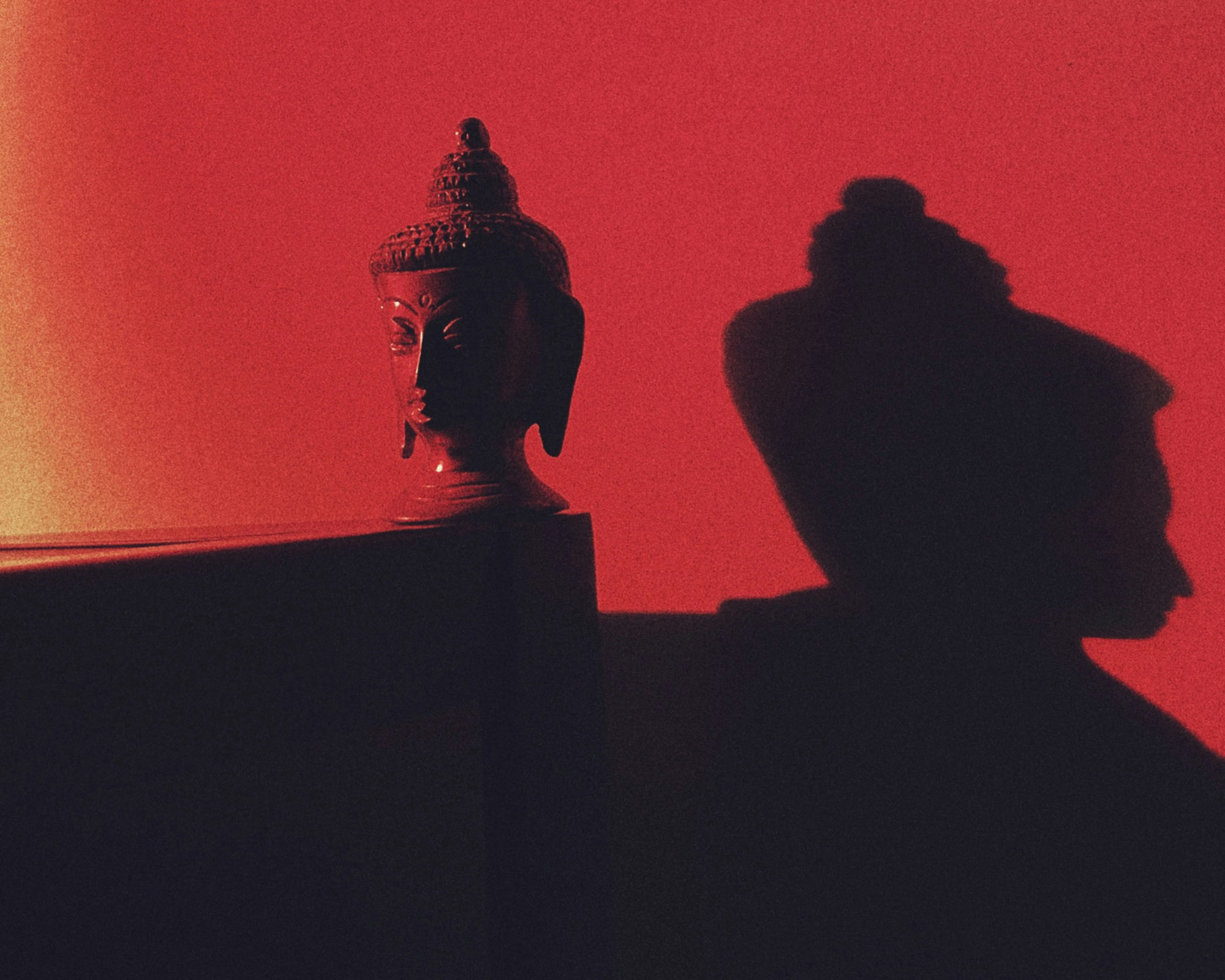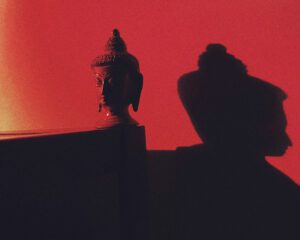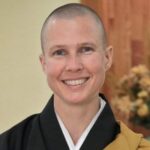Question: As a longtime practitioner in a particular Buddhist tradition, I know about a lot of political infighting, corruption, and abuse that many students aren’t aware of. This has shaken my belief not only in the institutions of Buddhism, but in the dharma itself. How do I maintain my faith in Buddhist teachings when I know what’s really going on behind the scenes?
Willa Blythe Baker: First of all, yes, there are shadows, and the longer you practice in the Buddhist tradition, the more you know. The infighting, corruption, and abuse that you have learned about over the years is not new—it is not a thing of this decade or this century. Buddhist institutions—like all religious institutions—are vulnerable to bad behavior.
The shadow can be painful and violent. But seeing the shadow is ironically a beautiful thing—it holds promise, if you can manage to see it with a long view. Witnessing the shadow of our community opens a doorway into the truth and reform. Only when these problems become fully known and seen in all their specificity and complexity can our communities find compassionate, transparent, and just ways to address entrenched issues.
Maybe you will discover that dharma and Buddhism are not synonymous.
It is important that we not shy away from what we know and what we see. If someone comes to us and says, “Things are not right,” we should listen deeply. We should be curious and invite conversation. Conversations that question the status quo should be an acceptable activity in sanghas. Conversations are how most social movements are born.
The recent #MeToo movement in Buddhism, for example, started with many small conversations and eventually normalized the discourse on sexual misconduct in many sanghas, making a subject that was once taboo suitable for open discussion. Stories that were once silenced became heard. This has led to the adopting of grievance procedures and ethics committees by sanghas that previously had none.
This kind of attention to the shadow might test your faith in the dharma at first. To feel shaken is understandable and natural. The responses of those who brush up close against misconduct can range from disappointment to devastation. I was there once too, just like you. You might need to separate from the sangha. Or you might need to let go of formal practice of the “dharma” altogether. If that happens, you have not failed. You might be on your way to finding a new dharma.
I put “dharma” in quotes above, because maybe these experiences are asking us to discover that dharma is not rituals or recitations. Maybe we are going to figure out what dharma really means. One of its definitions is “truth.” Leaning into the dark truth can become a profound path, an invitation to learn how to dance in the charnel ground. In the charnel ground, the shadow has to be reckoned with. We might learn how to tango with the fear and anger inside of us, to invite them to show us their dharmas. We might learn that they partner well with compassion, and that—in time—the shadow can become our ally.
Maybe you will discover that dharma and Buddhism are not synonymous. Ism is going to tie you to dogma. Perhaps the shadow will help you question everything, and that might lead you to a dharma of inquiry, curiosity, and not knowing. In the process, you might be drawn into a deeper faith, a wise faith, faith in your own experience.
Josh Korda: This is an important question, and one I can certainly empathize with from personal experience. I grew up with a Buddhist father, and over the last forty years have witnessed my share of internecine drama in an array of Buddhist lineages and traditions.
Teachers and practitioners are not the dharma itself. Teachers are merely messengers, doing our best to pass down a resource of wisdom that originated some 2,500 years ago. One goal of that work is to translate the dharma into tangible insights and practices Westerners can employ to enrich their lives or lessen their suffering; another is to embody the practices with the greatest rigor we can evoke.
To maintain faith we merely need to ask our fellow practitioners how the dharma has improved their lives.
Unfortunately, the attention and respect teachers are afforded means the work will, on occasion, attract some individuals with narcissistic disorders whose motivations lie in attaining power and influence rather than helping others. This is not a fault of the teachings; no spiritual or human tradition can be immune to manipulation. We just hope our spiritual institutions are honest enough to intervene in such events.
As for the practitioners who volunteer or fill roles within Buddhist institutions while trying to better their lives, they are by no means representative of the dharma; the human brain is a constant battlefield between “bottom-up,” ancient, survival-first impulses instilled by evolution versus the higher, “top-down,” spiritual impulses of harmlessness and altruism. Sometimes the older impulses will be stronger, and the petty, us-versus-them mindsets of our evolutionary past will take control. When they do, this is not the fault of the dharma.
So, in returning to the heart of your question, to maintain faith we merely need to ask our fellow practitioners how the dharma has improved their lives, offering some refuge from suffering, how it has provided a community that, while not perfect, is generally far safer and more healing than found elsewhere in the world.
Our faith, or saddha, should not be blind to the failings of our communities. It’s part of spiritual faith in action to call out infighting—note how many suttas in the Pali Canon tell us of the Buddha correcting his squabbling followers. Even the Buddha’s cousin, Devadatta, constantly tried to undermine the Buddha and take control of the sangha. Infighting is a result not of the dharma but of human nature itself.
If our faith should be so distracted by these failings that we lose sight of the bigger picture, then let’s reflect on how much good the dharma and its communities have brought those in need of support and healing. If the pandemic and its necessary social distancing protocols have taught us anything, it’s how much we need spiritual community to thrive. We are pack animals, after all, flailing about in the world for connection.
Tenku Ruff: The Zen monk Hakuin taught three important elements of practice: great faith, great doubt, and great determination. When we begin our Buddhist practice, great faith often leads the way, making everything seem bright and shiny; as we get to know the human beings with whom we practice, the shininess starts to wear off. People can find this disconcerting, especially when some of the shine comes from a glitter that we ourselves painted on.
Great doubt can be painful, forcing us to let go of our dream of a perfect teacher, a perfect sangha, and a perfect practice. And great doubt can be healthy, allowing us to let go of the extra glitter and to see the things as they are—not an artificially colored version of the dharma, but one that shines all by itself.
Whatever action you take, please make sure compassion is at the center.
The dharma does not belong to any one Buddhist teacher, community, or person. I want to emphasize this strongly, because moving through this place of doubt will require great determination. You will need every bit of the practice you have cultivated up to this point to continue and truly understand that no one can take the dharma away from you.
What systems of accountability are in place in your community to address corruption and abuse? And are community leaders following them? I encourage you to seek advice from a neutral, outside person with training in ethics. They can help you discern where the behaviors you are seeing fall on the continuum between misuse and abuse of power, as well as help you to discern what your own responsibilities are to the community.
As a person who has been in the community long enough to know the inside stories, you hold a particular duty to behave with integrity. Please take extra care to set a positive example by following the Buddha’s teachings on right speech and avoiding gossip or hearsay, which can cause further hurt to people who have already experienced deep harm. If what you are witnessing is indeed abuse, you may need to report it beyond the local community—to organization leaders or even to the authorities. A neutral person with ethics training can help you figure this out.
Whatever action you take, please make sure compassion is at the center, including compassion toward yourself. If you do not have the capacity to act, bring your concerns to someone who does. If you reach a point where leaving the community is the wisest choice, you will know that compassion and integrity led you to this point. And if you are able to find a way through this challenging period while remaining in the community, then your relationship with your practice and your community will deepen and settle. With compassion at your center, letting go of attachment to a particular outcome, please allow the dharma that comes from deep within to serve as your guide.
This article is available in Spanish in our section El Camino del Buda.
Este artículo está disponible en Español en nuestra sección El Camino del Buda.





